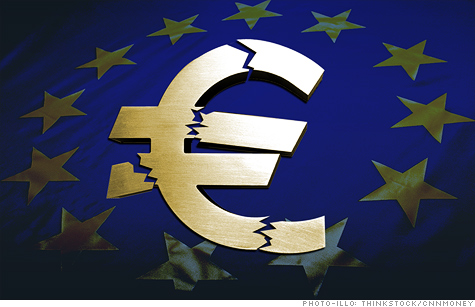
Experts remain optimistic that European leaders will deliver a plan to save the euro because the alternative would be "a complete and utter economic catastrophe."
NEW YORK (CNNMoney) -- Europe's debt crisis has dragged on for nearly two years and has only intensified by the day as leaders fail, time and time again, to deliver a credible solution. Yet investors and economists continue to bank on a big breakthrough.
Why? "Because without one, we'll be left with a complete and utter economic catastrophe," said Nick Kounis, head of macro research at ABN AMRO, speaking Wednesday at the annual Capital Link investor forum in New York.
While experts have prudently crafted contingency plans in case the euro area suffers a breakup, they don't expect that dramatic scene to play out.
"If the euro were to collapse, it would be disastrous for every country in the eurozone," said Kounis, who projects that a euro break-up would trigger a "super crisis" that would cost between 50% and 100% of the region's GDP over three years, along with sovereign defaults, bank failures, investor panic and uncertainty, a deep European recession, and overall wealth losses.
On the other hand, strengthening the euro would benefit all of the members of the eurozone, and the necessary bailouts would only amount to about 25% of GDP, said Kounis.
Hopes are high that European leaders will find a way to resolve the region's debt problems at the European Union summit on Thursday and Friday in Brussels.
While nobody knows for certain what will come out of this year's fourth and final major summit aimed at saving the euro, leaders will likely discuss the new fiscal pact cooked up by French President Nicolas Sarkozy and German Chancellor Angela Merkel earlier this week in Paris.
Standard and Poor's has warned that eurozone nations could face a string of downgrades if European leaders don't hammer out a solution by the end of the week.
Even if their best efforts are forthcoming, however, "a lot of damage has already been done," said Kounis.
Government bond yields have been rising throughout the eurozone; the 10-year Italian yield topped 7% earlier this month, and the Spanish 10-year bond yield flirted with that level. That 7% mark is worrisome because it previously eventually led to bailouts in Greece, Portugal and Ireland.
Meanwhile, the cost to insure eurozone debt against default has soared to record highs, and banks are tightening their lending standards.
All of those factors will weigh on European economies, and in turn, the global economy, said Kounis.
He expects global growth will slow to around 3% in 2012, down from 3.8% this year and 5% in 2010.
The eurozone will likely endure negative growth next year, down from 1.7% in 2011. The forecast for the U.S. economy also remains sluggish, and Chinese economic growth is also expected to slow. ![]()
| Overnight Avg Rate | Latest | Change | Last Week |
|---|---|---|---|
| 30 yr fixed | 3.80% | 3.88% | |
| 15 yr fixed | 3.20% | 3.23% | |
| 5/1 ARM | 3.84% | 3.88% | |
| 30 yr refi | 3.82% | 3.93% | |
| 15 yr refi | 3.20% | 3.23% |
Today's featured rates: